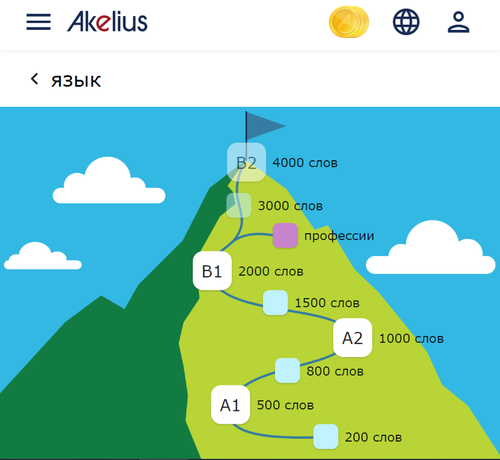In February 2023, commenting on the “Professions” section of the Russian as a Foreign Language course, which is hosted on the Akelius educational platform, was completed. A group of teachers from the International Information Technology University (IITU) is responsible for commenting on the posted lessons.
At the moment, 6 levels and the Professions section are available on the platform: A0 (200 words), A1 (500 words), A1.1 (800 words), A2 (1000 words), B0 (1500 words), B1 (2000 words). Two more levels are under development: B1.1 (3000 words) and B2 (4000 words).
The "Professions" section covers the following topics: repair and construction, cleaning and protection of the territory, production and delivery, at the hotel, style and beauty, help and care, healthcare, justice, in the office, flights and design.
IITU language experts, associate professor Dinara Aliyeva and assistant professor Oksana Bublikova told how the commenting process is set up. Experts use Trello, a cloud-based project management software, to keep in touch with developers. It is convenient because it allows to sort the found errors and get a quick response to comments and suggestions.
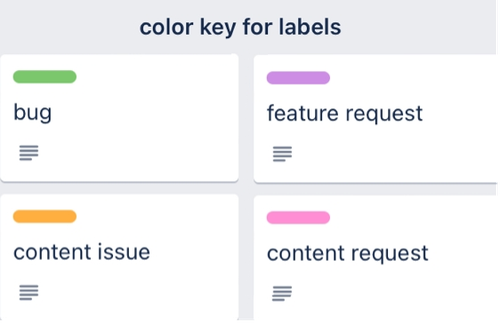
“In Trello, sections, on which we make comments, e.g. on content, design or technical errors, are highlighted in color. Basically, we had comments on the content. To describe the error, we take a screenshot, fix it as a link and write in the comments what is wrong,” Dinara Asylkhanovna said.
According to her, the developers quickly respond to the comments.
“On the same day or on the following day, we see a response to our comments: something is accepted, something is not and explanation is given. For instance, I had a remark that in the Profession section, you should also include Hobby. How ever, they explained that in the following lessons Hobby will be taken as a separate topic, so there is no need to include it here,” Dinara Asylkhanovna explains.
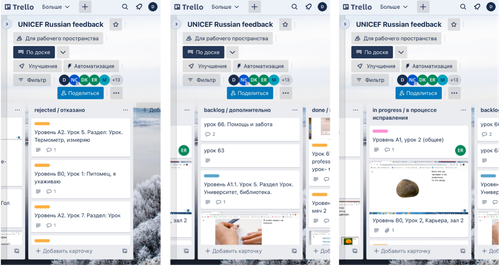
“In grammar there were comments that some commas were missing or a word was spelled incorrectly. This is promptly accepted and corrected,” Dinara Asylkhanovna says.
Oksana Vasiliyevna, for example, while commenting on the lessons, suggested that the course developers should replace the verb form “I vacuum” with one of the compound constructions.
“In Russian, it is recommended to use compound constructions in speech:
- I will vacuum;
- I 'll start vacuuming soon;
- I want to vacuum the apartment;
- You need to vacuum the carpet.
(In colloquial speech, they use both words «пылесосю», так и «пылесошу»)” Oksana Vasiliyevna wrote to the developers.
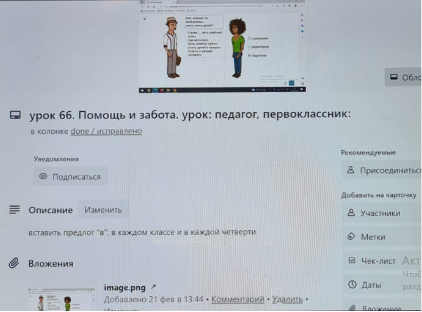
She also pointed out some bad examples with “creak” and “step” forms.
“The steps of the stairs creak under the weight of a person. Here: the steps creak when I go up the stairs. («Ступеньки лестницы скрипят под воздействием веса человека. Здесь: ступеньки скрипят, когда и поднимаюсь по лестнице.) A similar and not entirely good example with the form "I step" I step on the steps of the stairs and go up to the attic. (наступаю на ступеньки лестницы и поднимаюсь на чердак) They don't say like that in Russian, even in exercises. You can say I go up to the attic; I go up the stairs to the attic (поднимаюсь на чердак; я поднимаюсь по ступенькам на чердак), - Oksana Vasilievna advises.
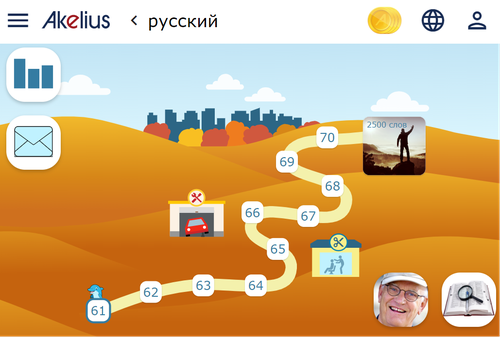
Such comments help improve the material, detect technical, linguistic, grammatical, cultural and other errors and improve the quality of the lesson.
